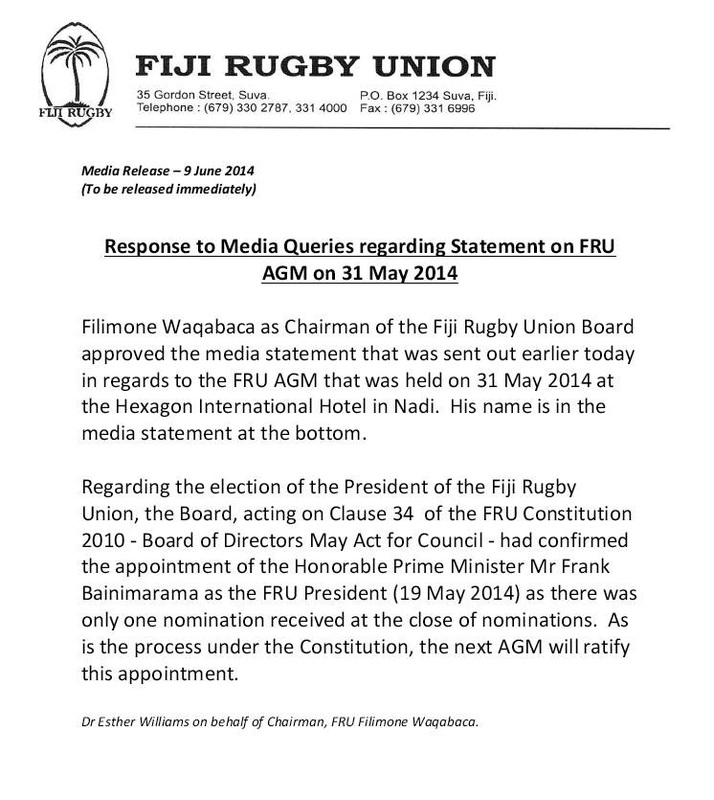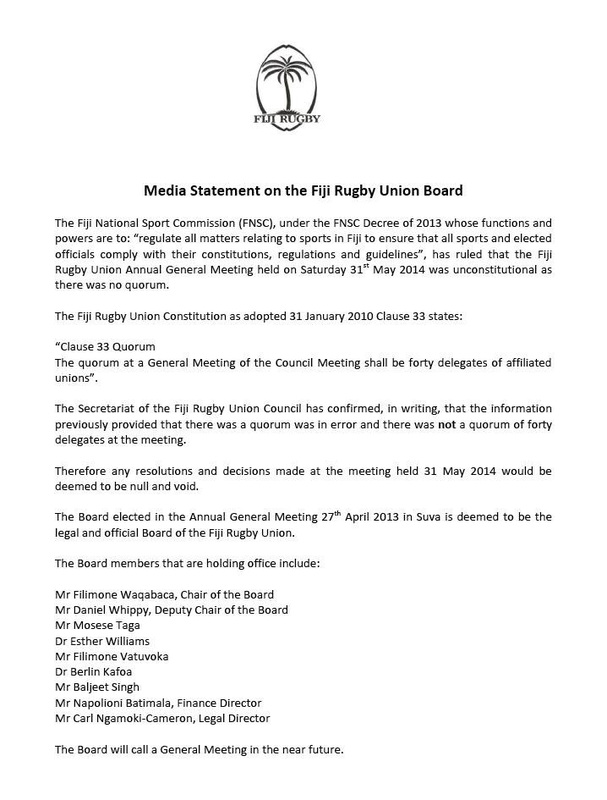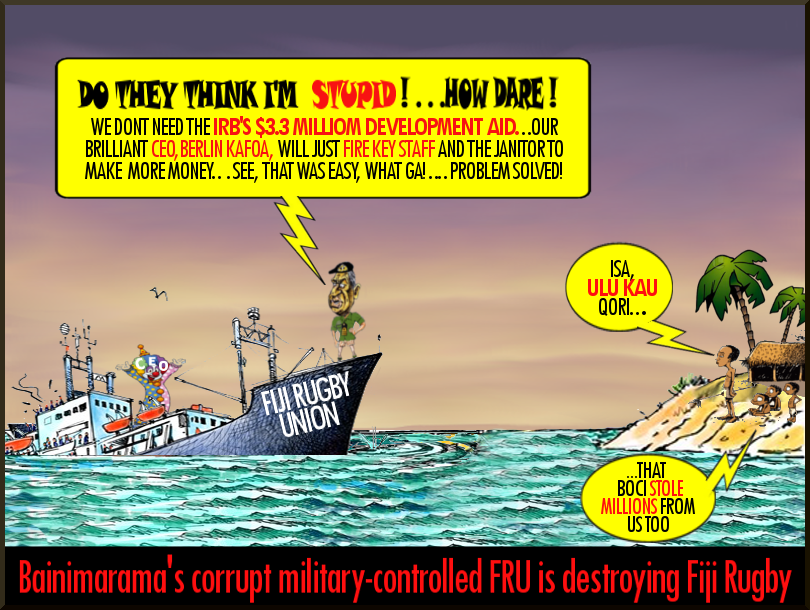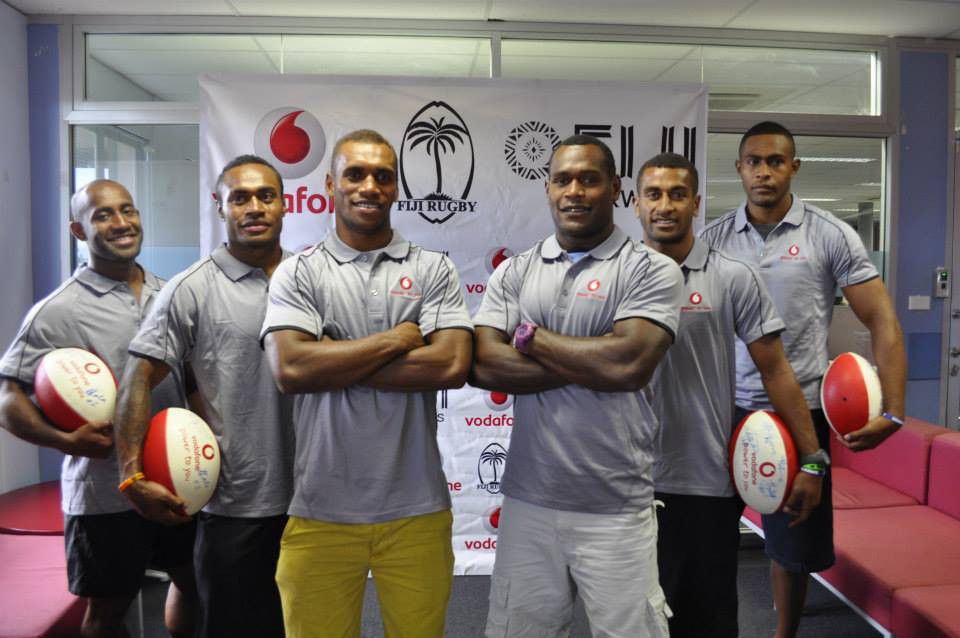By VICTOR LAL and Fijileaks Investigative Team:
In addition to the month-long RWC freebie, Bainimarama’s honorary role as president is of great potential significance in the coming election campaign where his most significant political challenge is likely to come from the rugby-worshipping indigenous voter
While the FNSC’s unprecedented intervention meant that Bainimarama’s appointment as President had to be revoked, Williams stepped in to clarify in a media statement that the board of directors had taken the unilateral decision to confirm Bainimarama as president even though these are powers vested in the annual general meeting
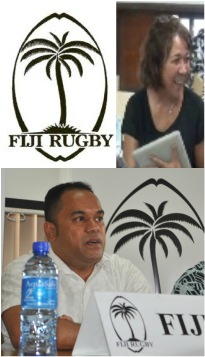 Williams (above right) and Waqabaca once
Williams (above right) and Waqabaca once again plunge FRU in deep water
Bainimarama’s nomination to be president of the FRU – which qualifies him for business class travel and five-star accommodation for the whole of the tournament, provided Fiji qualified - was imperilled by the incompetence of his own appointed nominee to the Fiji Rugby Union – Permanent Secretary Finance Filimone Waqabaca – as the FRU was forced to finally admit that the May 31 attempt at an Annual General Meeting was not lawful. Waqabaca told Fiji Live ‘there was some misunderstanding about numbers’ at the AGM, from which the media were banned.
The FRU was prodded into the admission by the Fiji National Sports Commission – which is effectively controlled by Bainimarama’s daughter, as CEO of the parallel Fiji Sports Council. The FNSC ruled that none of the appointments or motions made at the FRU’s annual general meeting – which requires a quorum of 40 - were legal. But the politics behind the FNSC’s intervention was clear. Although the FNSC trumpets itself as ensuring that ‘all sports and elected officials comply with their constitutions’ they have been strangely silent on the FRU’s breach of its own much more serious constitutional undertaking to hold an annual general meeting before the end of the April (clause 28). While the FNSC’s unprecedented intervention meant that Bainimarama’s appointment as President had to be revoked, Williams stepped in to clarify in a media statement that the board of directors had taken the unilateral decision to confirm Bainimarama as president even though these are powers vested in the annual general meeting.
Such had been the fury amongst provincial unions about the incompetence of the FRU board – (highlights include, abandoning its search for a CEO in January after Bainimarama rejected the board’s agreed choice, preparing for an expensive court case with Digicel about its Vodafone deal, and currently suspended from receiving IRB grants worth more than $3m because of governance issues) that three of the four elected board were given the boot.The vote of no confidence was triggered by the Lautoka and Nadroga unions
Those voted out of office included Williams – not a noted rugby personality prior to her appointment last year - former national prop Mo Taga and Waisea Vatuvoka. To replace them, delegates to the May 31 meeting had voted in Nadroga’s Tiko Matawalu, Marika Luveniyali and National Fire Authority chief executive John O’Connor as replacements. The three new board members attended one board meeting but, because of the fumbling over numbers, these nominations are now also invalid. Thus Williams has continued to act like a ‘zombie’ director – even though she knows she enjoys no support from the provincial unions that own the FRU – and will likely face a similar vote of no confidence whenever the AGM is eventually scheduled.
In addition to the month-long RWC freebie, Bainimarama’s honorary role as president is of great potential significance in the coming election campaign where his most significant political challenge is likely to come from the rugby-worshipping indigenous voter. Bainimarama would have been taking over as President from the Tui Madudu, Ratu Isikeli Tasere, who died in office. In one respect, the continuing shambles is a good thing for the political strategizing of Bainimarama. Delegates to the May 31 General Meeting – which was called off midway through the session to handle the vote of no confidence – did not get a chance to debate the financial report and matters relating to Vodafone’s controversial five-year sponsorship.
Huge political pressure from Bainimarama was placed on the FRU board, through Waqabaca, to accept a smaller cash deal from regime-friendly Vodafone than incumbent Digicel was prepared to pay. Vodafone tricked up its offer by padding it out a huge dollar value of unneccessary product in kind. So in February the FRU announced a $40 million, five-year sponsorship agreement with Vodafone leading a consortium of other Bainimarama-aligned companies like CJ Patel and Home Finance. Days later Waqabaca admitted that of that $40 million only $18 million was actually in cash: http://www.fijileaks.com/home/five-untruths-the-fiji-rugby-union-have-told-about-the-vodafone-deal. The remaining $22m is value-in-kind, some useful (like overseas travel for teams) but the majority is Vodafone commercial promotion expenditure and internal service provision to the FRU, talk-time credit etc.
In fact, as the permanent secretary Finance is expertly placed to know, the cash component is even less than the $18m (or $3.6 million per year). Delegates to the FRU annual general meeting would have seen the annual report make clear that Vodafone’s cash per year is shown as only $2.8m, or $14m over the five years. Because the FRU board agreed to make the $40m deal VAT inclusive, Rugby House has to pay 15 percent tax on the whole deal, not just the cash component. And the VAT payment to the government can only be paid in cash. So, $8m per year ($40m over five years) would generate an annual $1.2m VAT liability – to be paid from Vodafone’s annual $2.8m cash. This means that the net cash position provided by Vodafone may be as little as $1.6m once the VAT on the $8m/$40m is paid.
This compares with what Digicel has been quietly explaining to provincial union delegates they offered: $4.14m per year in cash – or more than $1.3m per year in cash more than Vodafone offered. The fact that Bainimarama and his appointee Waqabaca managed to drive the board to accept a lower cash value from Vodafone while exposing the FRU to a cripplingly high VAT liaibility is likely to be a key bone of contention when, if the AGM finally takes place.
It’s not clear when a rescheduled AGM is likely to be held: the FRU constitution requires at least 21 days notice to be given before a General Meeting but resolutions for the General Meeting need to be with the CEO 30 days before such a meeting. That would push the meeting well into July. This puts the FRU even further in breach of its own constitution which explains in 28.2 of the 2010 Constitution: ‘Members shall be given at least twenty-one days’ notice of the date of an Annual General Meeting and the Meeting shall be held no later than the last week of April in each year.’
Although Bainimarama is no respecter of constitutions even he and his acolytes can’t decree their way out of the problem this is causing. It’s understood that holding an annual general meeting – including having the accounts confirmed – is a critical condition that the IRB has demanded before considering the release of it’s currently-on-hold $3m of development funding. If that is the case, the Dublin body must be dismayed beyond belief: the AGM was scheduled for April 25 and postponed, re-set for May 17 and postponed a second time, re- re-set for May 31, abandoned half-way through and then retrospectively cancelled once it became clear no proper quorum was established: Fijileaks Team
